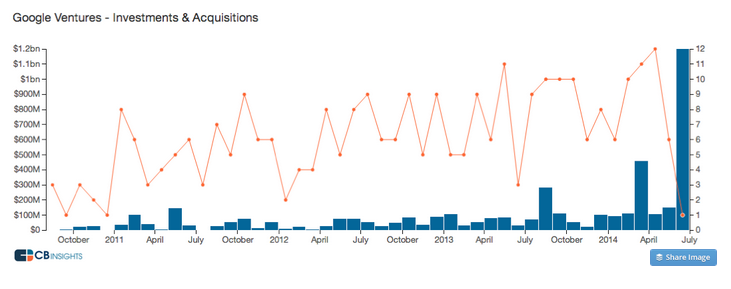European VC firms: Google Ventures crosses the pond, Seedcamp’s maturation and LVP’s gaming fund
Category: Analysis
acceleratorsInvestment trendsinvestorsVenture Capital
It’s been a great couple of weeks for the European startup ecosystem, as several big firms made some significant announcements that could have a heavy impact in Europe and across different sectors.
We’ve talked in the past about the status of the VC and accelerators scenes in Europe, and the following announcements could be interpreted as a sign of the maturation of the entrepreneurial economy in the EU.
Google Ventures has crossed the ocean
After weeks of rumors and speculation, Google finally announced the creation of a Google Ventures subsidiary in Europe. Led by partners Eze Vidra, Tom Hulme, Peter Read, Avid Larizadeh and, temporarily, MG Siegler, GVE will invest up to $100 million across the region.
The fund will be headquartered in London -where else could it be?- and it’s the first time Google Ventures has stepped outside of the US. “We believe Europe’s startup scene has enormous potential. We’ve seen compelling new companies emerge from places like London, Paris, Berlin, the Nordic region and beyond”, claims Bill Maris, Managing Partner of Google Ventures, in a statement.
Google Ventures Europe will invest up to $100 million across the region
Founded in 2009, Google Ventures has been raising eyebrows in the US as of late, especially after their investment in fast growing transportation startup Uber. In 2009 they had $100 million to invest, an amount that increased to $200 and $300 million in 2011 and 2012, respectively. If their European strategy follows the same pattern and the results are what Google is expecting, it wouldn’t be crazy to expect bigger funds in coming years.
At this stage Europe doesn’t need much validation, but it’s always good to see that big investment firms -or subsidiaries of corporates in this case- consider the continent and its startups as important players in the future.
How Google Ventures works and its impact on the European Venture Capital firms ecosystem
The best explanation out there about how Google Ventures works was published by CB Insights. In essence, the firm invests most of its money in the Internet Software & Services industry and has experienced a significant increase in activity in recent years: 65% YoY growth between Q2 2013 – Q1 2014 versus Q2 2012 – Q1 2013.
Christian Hernandez, from White Star Capital, and Stephen Piron, from Bright*Sun, published an interesting analysis of the potential impact of Google Ventures on the European ecosystem with the following conclusions:
- They invest early and stay for the long run
- 50% of their initial investments have been under $1 million and 60% below $2.5 million
- They tend to co-invest with other venture capital firms, which might be very good news for other European funds
Seedcamp’s maturation
When we interviewed Seedcamp’s Carlos Espinal his message was pretty clear: Seedcamp, unlike many other institutions, wants to enable acceleration at any stage of a founder’s business and Venture Capital in Europe is undergoing an evolution.
To prepare for the next evolution of accelerators, Seedcamp announced in mid July the launch of a $30 million fund to invest and accelerate European startups. “Providing the first $75,000 investment and a three-month program to support the growth of a $10 million business is not good enough anymore”, claims the company in a blog post.
Almost 50% of the money comes from the European Investment Fund and the rest from a bunch of professional investment firms and angel investors, including the venture arm of Spanish bank La Caixa, Caixa Capital Risc. Seedcamp aims to back 100 startups over the next four years and, if necessary, invest up to $250,000 in the most promising ones.
The participation of Caixa Capital Risc in the fund is not the only Spanish angle to Seedcamp’s story. Various Spanish startups have participated in Seedcamp’s multiple acceleration programs and academy sessions, including the likes of SocialBro, which has raised $3.3 million to date, 24symbols or Traity, which recently raised a $4.7 million Series A.
More money in the gaming sector
The performance of companies such as Rovio, Supercell or King.com has established Europe as one of the most important mobile gaming hubs in the world. And London Venture Partners wants to contribute.
The London-based firm announced a new early stage seed fund that will be focused primarily on European gaming startups. Paul Heydon, general partner of LVP, told TechCrunch that the plan is to invest in 20 to 25 companies in the next few years, with investments ranging from $50,000 to up to $500,000 and focusing on “where the best founders are”.
As we saw with Seedcamp, LVP’s new fund also has a Spanish angle. The firm invested in Barcelona-based startup Omnidrone -which has yet to launch its first product- and Heydon specifically claims that “we’re starting to see some morethings coming out of Spain”.
Will they continue to support Spanish gaming companies? Even if they don’t, something is clear: the European Venture Capital firms ecosystem is rapidly evolving. There’s more money for European startups than there ever was, and Seedcamp’s evolution and Google’s bet on Europe are great news for the continent.








